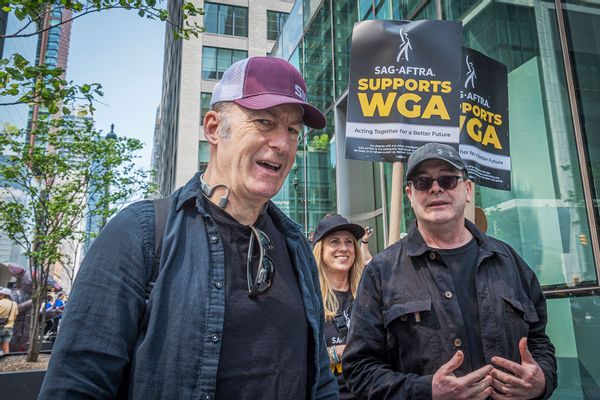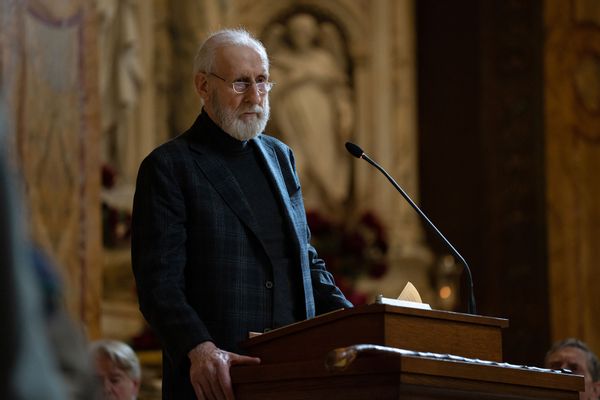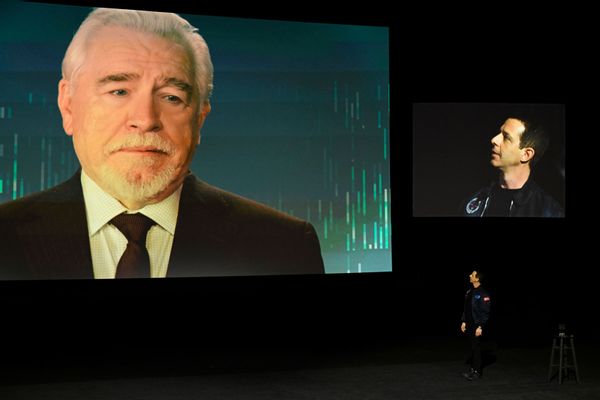
Every movement needs a face.
As SAG-AFTRA, the guild that represents film and TV actors, joins the Writers Guild of America in its labor strike against the Alliance of Motion Picture and Television Producers (AMPTP) there will be some debate over who's right for that job. In the short term Fran Drescher, the actors guild's president, leapt to the fore with her fiery strike announcement on Thursday.
"I cannot believe it, quite frankly, how far apart we are on so many things," Drescher said at the guild's press conference. "How they plead poverty, that they're losing money left and right when giving hundreds of millions of dollars to their CEOs. It is disgusting. Shame on them. They stand on the wrong side of history at this very moment."
Drescher is not exaggerating. The labor movement is experiencing a resurgence the likes of which hasn't been seen in decades. Los Angeles alone has been impacted by teachers, dock workers and hotel employees organizing work stoppages in recent months. Unionizing efforts continue at major companies, including Starbucks and Amazon.
Friday marks the first day that SAG-AFTRA hits the sidewalks, combining their 160,000-strong membership with striking WGA writers on the picket lines. Such a historic "double strike" with actors and writers walking out together hasn't occurred since 1960. The last time SAG-AFTRA went on strike was 43 years ago. (Salon's unionized employees are represented by the WGA East. The WGA represents 11,500 television and screenwriters.)
This also means that picket lines will turn into more of a spectacle than they already were. On the red carpet for the London premiere of "Indiana Jones and the Dial of Destiny" Harrison Ford and Phoebe Waller-Bridge both confirmed that they would be walking out. "I believe in unions. I believe in labor. I believe in representation, all of those things," Ford told a reporter. "If my union votes to go out, I'll go out."
That was in June. Much closer to the deadline the cast of the "Oppenheimer" walked that film's London step-and-repeat an hour earlier than originally scheduled, fully aware that it would be the last press event they'd be authorized to participate in for the foreseeable future. Strike rules prohibit actors from promoting any shows or films that have been produced or are in production under the guild's expired contract with the AMPTP.
That also all but guarantees that the Emmys will be postponed from its originally scheduled Sept.18 airdate.
If any A-listers walk the picket line they'll be late to a writer-stocked battlefront that's already been supported by stars such as Bob Odenkirk, Mandy Patinkin and the cast of "Ted Lasso."

Such visible support from beloved celebrities is potent. It can also be turned against the people who are striking for better working conditions and more equitable compensation, which the AMPTP – an alliance representing studios and media conglomerates – is counting on. Drescher's fiery call to arms resonates with the common worker whose wages haven't kept up with inflation, but scored highly among those who still view her with no shortage of fondness as the star of "The Nanny."
But as the combined strike rolls on and photographers capture actors wearing pieces of clothing worth more than the average person makes in a week, their demands for better pay might not land as solidly.
So allow me to suggest that Florence Pugh or Matt Damon aren't the best front-facing representatives of the striking guilds' determination. What this walkout needs, however, is a villain the people intimately understand. Give them "Succession" mogul Logan Roy.
"Shame on them. They stand on the wrong side of history at this very moment," said SAG-AFTRA president Fran Drescher.
The AMPTP has not trotted out a representative at whom we might might target our proverbial rotten tomatoes, only statements such as this : "A strike is certainly not the outcome we hoped for as studios cannot operate without the performers that bring our TV shows and films to life," the alliance declared Thursday. "The Union has regrettably chosen a path that will lead to financial hardship for countless thousands of people who depend on the industry."
This certainly makes it sound like this small group of very wealthy executives is very concerned about the little guy. Major media corporations' PR teams are experts at saying what they believe the little people want to hear. In this moment, however, that message is about a decade out of date.
But "Succession" gets it. References to the drama showed up on picket signs early in the WGA strike when writers humorously threatened to spoil its ending. In May, when the writers began picketing, the Roys were all anyone who watched TV could talk about. This week the show was nominated for 27 Emmys including best drama and acting nods for its four leads including Brian Cox, who plays Logan.

Lest we miss one of the central messages of the show, its creator and WGA member Jesse Armstrong spells out who Logan Roy was in the eulogy delivered by this brother Ewan, played by James Cromwell.
Logan, Ewan says, "fed that dark flame in men, the hard, mean, hard-relenting flame that keeps their heart warm while another grows cold. Their grain stashed while another goes hungry. And even has the temerity to tell that hard but funny joke about the man in the cold. You can get a little high, a little mighty when you're warm."
Now, imagine a small group of Logans working together against tens of thousands of writers and actors, most of whom simply want to pay their rent and buy groceries (or fresh pizza!) by plying their craft. Or, you know, don't imagine. Turn on your TV for a rewatch. Better yet, simply wait for someone like Disney CEO Bob Iger to open his mouth in front of a microphone.
On Thursday's episode of CNBC's "Squawk Box," Iger assured viewers that he takes the writers and actors guilds' concerns about equitable compensation seriously. Nevertheless, "There is a level of expectation they have that is just not realistic," he said after bemoaning all the disruptive forces hitting the business, which hasn't entirely recovered from COVID.
"This is the worst time in the world to add to that disruption," he said, with the postcard-perfect mountains looming in the background. CNBC caught up with Iger at the famous Allen & Company Sun Valley conference, a retreat colloquially known as "summer camp for billionaires." You know, like "Argestes."
"There is a level of expectations that [the writers and actors] have that is just not realistic," says $DIS CEO @RobertIger on the @sagaftra and WGA strike. "They are adding to a set of challenges that this business is already facing and that is very disruptive." pic.twitter.com/ySYvfQBYA5
— Squawk Box (@SquawkCNBC) July 13, 2023
The day before that interview, Iger signed a contract extension with Disney that bumps up his annual target salary from $27 million to $31 million, provided he remains with the company through 2026 instead of 2024 and meets certain goals. Like, say, "cost-cutting."
This places him in the ballpark of Netflix's co-CEO and chief content officer Ted Sarandos, whose 2022 compensation plan is valued at around $50 million, according to a recent Los Angeles Times analysis of data provided by Equilar, Inc. factoring in stock options, base salaries and bonuses. His co-CEO, company chairman Reed Hastings, pulled around $51 million that same year.
Warner Bros. Discover chief David Zaslav only made around $39 million in 2022, according to a recent Securities and Exchange Commission filing. But in 2021 he famously pocketed a $246.6 million compensation package that included stock options worth $201 million. Between 2018 and 2022, Zaslav – one guy – made $498,915,318, according to that L.A. Times report.
Imagine a small group of Logan Roys working together against tens of thousands of writers and actors.
Two months ago at a party Zaslav hosted at Cannes, a guest was overheard saying, according to the Wall Street Journal, "This is what a recession looks like," while gesturing at two megayachts in the distance. "There used to be 20 of these."
Rupert and Lachlan Murdoch pulled lower salaries than any of these men in 2022 – technically – which is important to note since Logan Roy is largely based on Rupert.
Meanwhile the WGA says the median screenwriter pay has dropped 14% when adjusted for inflation over the last five years, while the L.A. Times report indicates that the average pay for top studio executives rose 53% from 2018, roughly 108 times the average writer's pay.
Among other key issues, both the WGA and SAG-AFTRA are striking for better wages and residuals, along with a more equitable compensation structure related to streaming content. Placing safeguards around the user of artificial intelligence to generate scripts or digitize and use performers' likenesses without payment or approval is also an existential issue.
These gains would help mainly writers and actors who once made a living that qualified them as middle class, so if you're worried about how Tom Cruise will manage these difficult days, don't.
Instead, keep a close eye on how this strike progresses after this week's injection of star power. With the actors in the fight, the likelihood of this strike's outcome influencing future labor negotiations has increased substantially. History proves this by way of former SAG-AFTRA president Ronald Reagan, who led his guild on strike shoulder to shoulder with writers in 1960.
However, the Reagan I'm referencing is his August 1981 version, when he was serving his first term as President of the United States. One of Reagan's earliest presidential acts was to publicly and swiftly crush a strike called by the Professional Air Traffic Controllers union. Those workers sought across-the-board raises of at least 10%. The government offered 5%, which the union did not accept.
Reagan declared the strike to be unlawful, announcing that air traffic controllers who walked off their jobs had 48 hours to return to their jobs or lose them. And he was true to his word. The people who returned to work kept the planes in the air and ensured travel continued without interruptions. Those who remained on the picket line were fired.

As Reagan's head of employees Donald Devine told NPR's Planet Money in 2019, other industries' executives took note. "Businessmen would come up to me and say, you know, when your guy, Reagan, stood firm with those guys, I started getting tougher with my unions, too; I realized I was giving away the store," Devine said.
With this single blow Reagan transformed striking workers from heroes to troublemakers messing up the system for good, reliable employees.
Unions have been gaining momentum in recent years, but this strike's visibility could be a decisive swing in the opposite direction of what Reagan set in motion 42 years ago.
"Eventually, the people break down the gates of Versailles, and then it's over," Drescher warned on Thursday. "We're at that moment right now." Her battle cry was pitch perfect, and it looks like everyday people tuned in.
But if movies and TV have taught us anything, if you want to hold people's attention you must show them a villain worth defeating. Cox and "Succession" served up a brilliant one, available any time we nine-to-fivers (if only!) forget why these labor walkouts need to happen.







